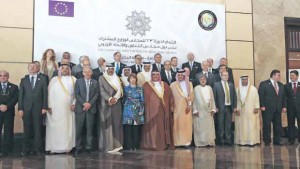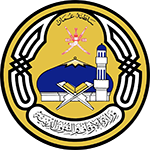Foreign Policy
 The Sultanate has a long history of contacts and relations with countries both within and outside the Arab world. Over many centuries, trade has flourished with the Indian sub-continent and Far East, and in more recent times, with East Africa. The Sultanate was the first Arab country to establish diplomatic contact with the United States of America in the first half of the 19th century. At this time, Oman already had relations with France and UK.
The Sultanate has a long history of contacts and relations with countries both within and outside the Arab world. Over many centuries, trade has flourished with the Indian sub-continent and Far East, and in more recent times, with East Africa. The Sultanate was the first Arab country to establish diplomatic contact with the United States of America in the first half of the 19th century. At this time, Oman already had relations with France and UK.
In 1970, the Sultanate of Oman faced the formidable challenge of winning diplomatic recognition in international circles after years of isolation. In 1971, Oman joined the Arab League and the United Nations. In 1972, the Sultanate became a member of the Islamic Conference Organisation and in 1973, a member of the Non-Aligned Group of Nations. Since then, Oman has joined many international and regional organisations (GCC).
Oman’s foreign policy, as developed since 1970, is based on three basic principles: the development and maintenance of good relations with Oman’s neighbours, a pragmatic approach to bilateral relations, emphasising underlying geostrategic realities rather than temporary ideological positions and the search for security through co-operation and peace, rather than conflict.These principles have been consistently applied and in the post-1989 international context have proved both valuable and durable.
Oman has been fully committed to the Middle East peace process since its inception in 1991. The Sultanate joins the international community in calling for the achievement of a lasting, just and comprehensive peace which will bring stability and prosperity to the whole region, as well as peace and security for its entire people. Oman continues to affirm its complete support for the legitimate rights of the Palestinian people to determine their own future in their own land, including the establishment of an independent state. Oman has participated actively in the multilateral talk’s phase of the peace process and has steadfastly opposed the use of violence and terrorism.
In January 1996, representatives of Oman and Israel signed a letter of understanding on the establishment of Trade Representative Offices in Muscat and Tel Aviv to develop economic, scientific and trade relations. Oman closed the Israeli Trade Office in October 2000 after the start of the second Intifada.
In August 2006, Oman condemned the Israeli raids on Lebanon as an unjustifiable act of aggression, in the belief that the destruction of domestic utilities like power stations was totally unacceptable to world opinion and did not serve the peace process. The Sultanate has a long history of contacts and relations with countries both within and outside the Arab world. Over many centuries, trade has flourished with the Indian sub-continent and Far East, and in more recent times, with East Africa. The Sultanate was the first Arab country to establish diplomatic contact with the United States of America in the first half of the 19th century. At this time, Oman already had relations with France and UK.
The Sultanate has a long history of contacts and relations with countries both within and outside the Arab world. Over many centuries, trade has flourished with the Indian sub-continent and Far East, and in more recent times, with East Africa. The Sultanate was the first Arab country to establish diplomatic contact with the United States of America in the first half of the 19th century. At this time, Oman already had relations with France and UK.
In 1970, the Sultanate of Oman faced the formidable challenge of winning diplomatic recognition in international circles after years of isolation. In 1971, Oman joined the Arab League and the United Nations. In 1972, the Sultanate became a member of the Islamic Conference Organisation and in 1973, a member of the Non-Aligned Group of Nations. Since then, Oman has joined many international and regional organisations (GCC).
Oman’s foreign policy, as developed since 1970, is based on three basic principles: the development and maintenance of good relations with Oman’s neighbours, a pragmatic approach to bilateral relations, emphasising underlying geostrategic realities rather than temporary ideological positions and the search for security through co-operation and peace, rather than conflict.These principles have been consistently applied and in the post-1989 international context have proved both valuable and durable.
Oman has been fully committed to the Middle East peace process since its inception in 1991. The Sultanate joins the international community in calling for the achievement of a lasting, just and comprehensive peace which will bring stability and prosperity to the whole region, as well as peace and security for its entire people. Oman continues to affirm its complete support for the legitimate rights of the Palestinian people to determine their own future in their own land, including the establishment of an independent state. Oman has participated actively in the multilateral talk’s phase of the peace process and has steadfastly opposed the use of violence and terrorism.
In January 1996, representatives of Oman and Israel signed a letter of understanding on the establishment of Trade Representative Offices in Muscat and Tel Aviv to develop economic, scientific and trade relations. Oman closed the Israeli Trade Office in October 2000 after the start of the second Intifada.
In August 2006, Oman condemned the Israeli raids on Lebanon as an unjustifiable act of aggression, in the belief that the destruction of domestic utilities like power stations was totally unacceptable to world opinion and did not serve the peace process.

